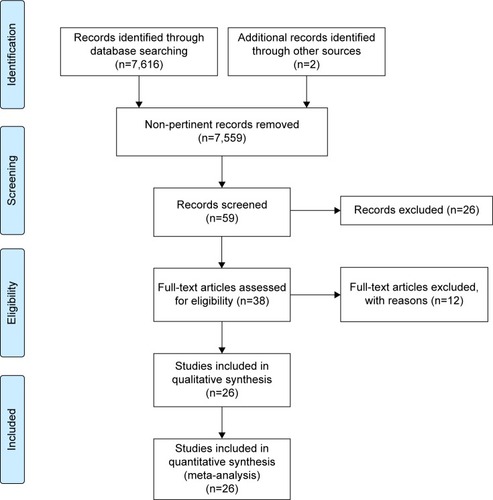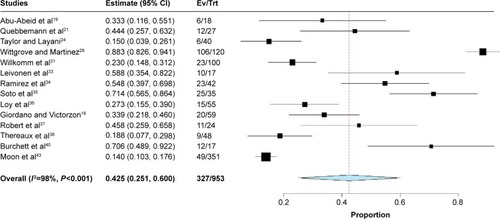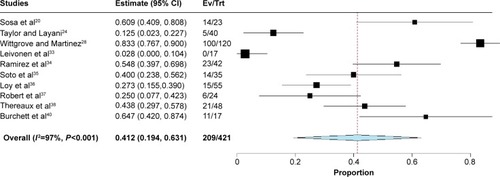Abstract
Controversy exists regarding the effectiveness and safety of bariatric/metabolic surgery in elderly patients. We performed a systematic review on this issue in patients aged 60 years or older. MEDLINE, Cochrane Library, Embase, Scopus, and Google Scholar were searched until August 2015 for studies on outcomes of bariatric surgery in elderly patients. The results were expressed as pooled proportions (%) with 95% confidence intervals. Heterogeneity across the studies was evaluated by the I2 test, and a random-effects model was used. Twenty-six articles encompassing 8,149 patients were pertinent with this issue and included data on bariatric surgery outcomes in elderly population. Fourteen patients died during the 30-day postoperative period, with a pooled mortality of 0.01%. Pooled overall complication rate was 14.7%. At 1-year follow-up, pooled mean excess weight loss was 53.77%, pooled diabetes resolution was 54.5%, and pooled hypertension resolution was 42.5%, while pooled lipid disorder resolution was 41.2%. Outcomes and complication rates of bariatric surgery in patients older than 60 years are comparable to those in a younger population, independent of the type of procedure performed. Patients should not be denied bariatric surgery because of their age alone.
Introduction
Life expectancy has been steadily increasing regardless of sex and ethnic background in the USA.Citation1 In Finland, life expectancy of a 60-year-old woman in 2008 was 24.3 years, whereas for a man of the same age, it was 22.8 years.Citation2
Obesity is known to decrease the quality of life as well as life expectancy,Citation3 and bariatric/metabolic surgery is the most effective treatment for morbid obesity.Citation4 The efficacy of bariatric procedures in the induction and maintenance of weight loss is largely superior to that obtainable by current medical therapies.Citation4 Surgery results in greater weight loss and improvement in weight-associated comorbidities compared with nonsurgical interventions, regardless of the type of procedure used.Citation4
Several studies have compared weight loss outcomes between different types of bariatric surgeries,Citation5 or different techniques of the same procedure,Citation6 whereas others have analyzed different preoperative predictors, with controversial results.Citation7–Citation11 Only few studies have aimed at analyzing the effects of age on weight loss in a sufficiently large cohort of patients undergoing the same bariatric operation, and long-term follow-up data are often lacking.
There is some evidence that elderly patients lose less weight and benefit less from bariatric surgery than younger patients.Citation12,Citation13 However, controversy exists regarding the indications and outcomes of bariatric/metabolic surgery in elderly patients. In some studies, younger bariatric patients have better comorbidity, mortality, and weight loss outcomesCitation12,Citation13 compared to older patients. Surgical indications for elderly patients should be carefully considered,Citation12 although weight loss and reduction in comorbidities and mortality of patients older than 55 years might be comparable to the general bariatric surgery population.Citation14–Citation16
We performed a systematic review on this issue to summarize the current evidence in patients 60 years or older who have so far been considered high-risk patients.
Methods
A literature search was performed through MEDLINE, Cochrane Library, Embase, Scopus, and Google Scholar for any study written in English on bariatric and metabolic surgery in elderly patients. We applied Boolean searches to above-mentioned databases using the following search terms: morbid obesity, bariatric surgery, metabolic surgery, gastric bypass, sleeve gastrectomy, adjustable gastric banding, biliopancreatic diversion, duodenal switch, elderly, over 55/60 years, advanced age, and old.
The search was performed in August 2015, aiming at those studies showing outcomes of bariatric/metabolic surgery in patients aged 60 years or older. In addition, the reference lists of all relevant articles were searched. Only full-length articles written in English were considered for this systematic review.
A cutoff at 60 years of age was chosen, although the age of 55 has been commonly used to define older age in the bariatric literature.Citation14–Citation16 It was considered an appropriate cutoff for the purposes of this study, as the age of 55 is low in the non-bariatric surgery literature. Data were retrieved only from the articles, and no attempt was made to get missing data from the authors. We retrieved data on study size, type of intervention, excess weight loss (EWL) percentage, outcomes at 1-year follow-up, 30-day mortality, and diabetes, hypertension, and lipid disease resolution percentages at the minimum of 1-year follow-up.
Statistical analysis was performed using the freely downloadable software Open Meta-Analyst.Citation17 The results were expressed as pooled proportions (%) with 95% confidence intervals (CIs). Heterogeneity across the studies was evaluated using the I2 test. Because heterogeneity was anticipated among the observational studies, the evaluation was made a priori by using a random-effects model (DerSimonian–Laird).
We followed the Preferred Reporting Items for Systematic and Meta-analysis statement for reporting this systematic review,Citation18 and the language of the articles was defined as reported in MEDLINE.
Results
The literature search yielded 7,625 articles, 26 of whichCitation16,Citation19–Citation43 were pertinent to our study, and sources of reported outcomes of bariatric surgery in patients 60 years or older (). The literature search flowchart is shown in . Different types of bariatric surgery procedures were involved. The analysis encompassed a total of 8,149 patients. Fourteen patients died during the 30-day postoperative period, with an untransformed proportion of 0.01% (95% CI 0.01–0.02; ). Pooled overall complication rate was 14.7% (95% CI 11.0–18.3; ), ranging from 1.33%Citation39 to 47%.Citation33
Table 1 Characteristics of the included studies
Figure 2 Forest plot summarizing the 30-day mortality.
Abbreviations: CI, confidence interval; Ev/Trt, event/treated.
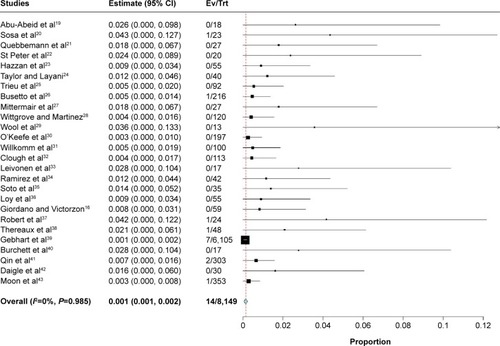
Figure 3 Forest plot summarizing the overall complications occurred.
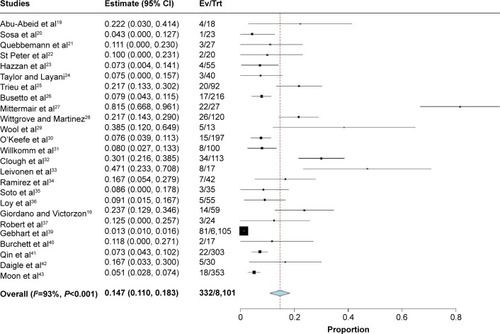
Pooled mean EWL% was 53.77% (95% CI 48.42–59.13; ), including 15 studies.
Figure 4 Forest plot summarizing the EWL% at 1-year follow-up or later.
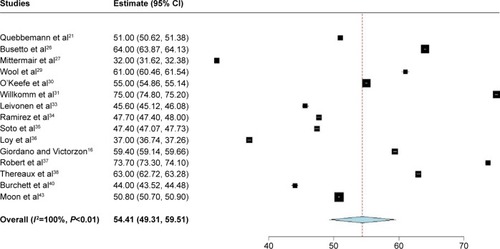
Seventeen studies showed results on diabetes resolution, ranging from 33%Citation42 to 83%,Citation33,Citation40 with a pooled mean of 54.5% (95% CI 39.1–69.1; ).
Figure 5 Forest plot summarizing the diabetes resolution at 1-year follow-up or later.
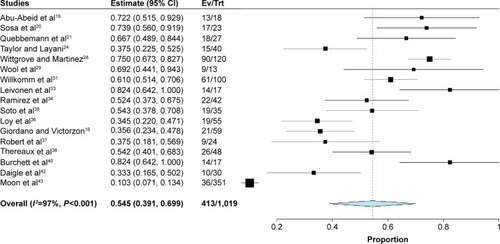
Similarly, 14 studies reported data on hypertension resolution, ranging from 14%Citation43 to 88%,Citation28 with a pooled mean of 42.5% (95% CI 25.1–60.0; ), while ten studies reported results on lipid disease resolution, ranging from 2.8%Citation33 to 83%,Citation28 with a pooled mean of 41.2% (95% CI 19.4–63.1; ).
Discussion
This systematic review involving 8,149 patients provides a compelling insight into the value of bariatric surgery in patients 60 years or older. Our pooled analysis showed an overall low mortality and an acceptable complication rate (0.01% and 14.7%, respectively), while pooled EWL% was successful (53.77%; ) at 1-year follow-up in this population that has been considered high risk.
The prevalence of obesity among populations 60 years or older is likely to increase as the baby boomer generation continues to age. Thus, the number of elderly patients undergoing bariatric surgery is increasing.
Recent large studies have showed that body mass index and age are strong risk predictors for 30-day mortality in Laparoscopic Roux-en-Y Gastric Bypass (LRYGB) patients,Citation44–Citation46 demonstrating even a linear relationship between increasing body mass index and increasing age with mortality risk.Citation45 However, the number of bariatric surgery procedures performed in elderly patients has been growing significantly during the past decade,Citation39 with >10% of patients older than 60 years in the USA. Indeed, this patient volume increase has coincided with a reduction in mortality and perioperative morbidity.Citation39
A large multicenter study demonstrated that older age predicts prolonged length of hospital stay but not major events following bariatric surgery, although a statistically nonsignificant trend toward predicting mortality was detected.Citation46 More recently, Spaniolas et alCitation47 demonstrated that in elderly population, sleeve gastrectomy is not associated with significantly different 30-day outcomes compared to LRYGB, and both procedures showed acceptably low morbidity and mortality rates.
Older patients might lose less weight because of impaired metabolic capacity and greater presence of sarcopenia compared to younger patients. They have suffered from associated comorbidities longer, which might have an influence in their baseline physical condition.Citation13
Energy requirements normally decrease with ageCitation48 with a lower lipolytic capacity,Citation49 especially after sympathetic stimulation.Citation50 This might explain the increased adipose tissue deposition in older subjects. Reduced lipolytic activity has been described in obese, postmenopausal women subjected to a hypocaloric diet.Citation51 These findings suggest that older obese women have a decreased capacity to use energy through the mobilization of lipids from fat stores, and this could also induce a larger caloric intake after surgery. This fact has recently been demonstrated measuring the short-term weight loss in women 20–45 years versus 55–65 years of age following bariatric surgery. The weight loss was significantly higher in younger women but not in men, indicating a role played by estrogens.Citation52 On the other hand, a greater reduction in energy intake after LRYGB has been detected in younger patients.Citation53
Total body energy expenditure begins to decline from the age of 40 years,Citation54 and this age-dependent decrease is apparently due to a reduction in physical activity.Citation55 The more sedentary lifestyle seems to be one reason for lower weight loss in patients older than 55 years.Citation56 Younger patients may have more active lifestyles with better exercise tolerance, and it is well known that successful long-term weight maintenance is associated with a physically active lifestyle.Citation57
As mentioned, the age of candidates for surgery is increasing.Citation58 There is a detrimental impact of age on wound healing in all tissues. Aging intrinsically and extrinsically impacts the skin, leading to atrophy, progressive loss of function, increased vulnerability to the environment, and decreased homeostatic capability.Citation59 At the microscopic level, there are decreased levels of growth factors, and diminished cell proliferation and migration. Diminished extracellular matrix slows wound healing.Citation59 These factors together with higher comorbidity prevalence in elderly patients may explain the higher complication rates.
However, three recent reviews on this topic show a good weight loss efficacy in elderly with acceptable risks.Citation14,Citation60,Citation61 We performed a pooled analysis in order to quantify those risks and show the achieved results.
Although outcomes might be worse than in younger patients,Citation12,Citation13 our pooled analysis demonstrated a significant EWL, and an overall improvement in the most common obesity-related comorbidities in patients ≥60 years (–). We concluded that elderly patients do benefit from bariatric surgery with acceptable rates of morbidity and mortality, which might justify taking a higher perioperative risk. In a recent statement, the Italian Society for Bariatric and Metabolic Surgery has extended the indications for bariatric surgery for morbidly obese patients up to 70 years of age.Citation62
Age alone should not be an absolute contraindication for bariatric surgery. Indications should be carefully evaluated in the light of routine preoperative tests and discussed with the patients knowing that there are some risks, and that the results might not be as good as they might expect.
The current study has several limitations and potential bias influencing these findings.
There was a paucity of well-reported studies, and there were differences in what was considered elderly population, with discrepancies in lower age limit varying from 50 to 70 years. Most of the studies contained <100 patients. Furthermore, the reporting of confidence measures was poor, introducing further inaccuracy in our calculations. We did not attempt to show pooled results from different bariatric procedures as data were mostly unavailable, and the main aim of this review was to give a compelling picture of bariatric surgery in a population of 60 years or older.
The types of complications were mostly not classified. Only one study adopted the Clavien–Dindo Classification.Citation16 Thus, we pooled together all major and minor complications in order to show the overall complication rate (). Follow-up time and adherence were different among the studies, and the comorbidity resolution rates were measured at the last follow-up control. We did not attempt to analyze other conditions such as obstructive sleep apnea, joint disease, gastroesophageal reflux, depression, and asthma because of the paucity of reported data.
Conclusion
This systematic review supports the use of bariatric surgery in elderly patients. Older patients should not be denied an operation only because of their age. However, elderly patients should be carefully counseled about the slightly increased risks and the possibility of less satisfactory outcomes.
Acknowledgments
We thank Jaana Elberkennou, MD, MA, for her kind revision of the English language.
Disclosure
The authors have no conflicts of interests to declare.
References
- AriasEUnited States life tables, 2010Natl Vital Stat Rep20146316325383611
- Statistics Finland Available from: http://pxweb2.stat.fi/database/statfin/vrm/kuol/kuol_fi.aspAccessed June 7, 2015
- FlegalKMKitBKOrpanaHGraubardBIAssociation of all-cause mortality with overweight and obesity using standard body mass index categories: a systematic review and meta-analysisJAMA2013309718223280227
- ColquittJLPickettKLovemanEFramptonGKSurgery for weight loss in adultsCochrane Database Syst Rev20148CD00364125105982
- AngrisaniLCutoloPPFormisanoGNossoGVitoloGLaparoscopic adjustable gastric banding versus Roux-en-Y gastric bypass: 10-year results of a prospective, randomized trialSurg Obes Relat Dis20139340541323453785
- StefanidisDKuwadaTSGersinKSThe importance of the length of the limbs for gastric bypass patients – an evidence-based reviewObes Surg201121111912420680504
- LutfiRTorquatiASekharNRichardsWOPredictors of success after laparoscopic gastric bypass: a multivariate analysis of socioeconomic factorsSurg Endosc200620686486716738971
- NguyenNTRiversRWolfeBMFactors associated with operative outcomes in laparoscopic gastric bypassJ Am Coll Surg2003197454855514522321
- MeltonGBSteeleKESchweitzerMALidorAOMagnusonTHSuboptimal weight loss after gastric bypass surgery: correlation of demographics, comorbidities, and insurance status with outcomesJ Gastrointest Surg200812225025518071836
- HarvinGDeLeggeMGarrowDAThe impact of race on weight loss after Roux-en-Y gastric bypass surgeryObes Surg2008181394218080726
- DesaiMMZhangPHennessyCHSurveillance for morbidity and mortality among older adults – United States, 1995–1996MMWR CDC Surveill Summ199948872510634269
- ScozzariGPasseraRBenvengaRToppinoMMorinoMAge as a long-term prognostic factor in bariatric surgeryAnn Surg2012256572472823095615
- ContrerasJESantanderCCourtIBravoJCorrelation between age and weight loss after bariatric surgeryObes Surg20132381286128923462862
- LynchJBelgaumkarABariatric surgery is effective and safe in patients over 55: a systematic review and meta-analysisObes Surg20122291507151622718467
- FrutosMDLujánJHernándezQValeroGParrillaPResults of laparoscopic gastric bypass in patients > or =55 years oldObes Surg200616446146416608611
- GiordanoSVictorzonMLaparoscopic Roux-en-Y gastric bypass is effective and safe in over 55-year-old patients: a comparative analysisWorld J Surg20143851121112624318411
- BrodleyCELauJSchmidCHOpen Meta-Analyst2014 Available from: http://tuftscaes.org/open_meta/
- MoherDLiberatiATetzlaffJAltmanDGPreferred reporting items for systematic reviews and meta-analyses: the PRISMA statementInt J Surg2010833634120171303
- Abu-AbeidSKeidarASzoldAResolution of chronic medical conditions after laparoscopic adjustable silicone gastric banding for the treatment of morbid obesity in the elderlySurg Endosc200115213213411285954
- SosaJLPomboHPallaviciniHRuiz-RodriguezMLaparoscopic gastric bypass beyond age 60Obes Surg200414101398140115603658
- QuebbemannBEngstromDSiegfriedTGarnerKDallalRBariatric surgery in patients older than 65 years is safe and effectiveSurg Obes Relat Dis20051438939216925254
- St PeterSDCraftROTiedeJLSwainJMImpact of advanced age on weight loss and health benefits after laparoscopic gastric bypassArch Surg2005140216516815723998
- HazzanDChinEHSteinhagenELaparoscopic bariatric surgery can be safe for treatment of morbid obesity in patients older than 60 yearsSurg Obes Relat Dis20062661361617138231
- TaylorCJLayaniLLaparoscopic adjustable gastric banding in patients > or =60 years old: is it worthwhile?Obes Surg200616121579158317217633
- TrieuHTGonzalvoJPSzomsteinSRosenthalRSafety and outcomes of laparoscopic gastric bypass surgery in patients 60 years of age and olderSurg Obes Relat Dis20073338338617400516
- BusettoLAngrisaniLBassoNItalian Group for Lap-BandSafety and efficacy of laparoscopic adjustable gastric banding in the elderlyObesity (Silver Spring)200816233433818239641
- MittermairRPAignerFObermüllerSResults and complications after Swedish adjustable gastric banding in older patientsObes Surg200818121558156218830777
- WittgroveACMartinezTLaparoscopic gastric bypass in patients 60 years and older: early postoperative morbidity and resolution of comorbiditiesObes Surg200919111472147619705206
- WoolDBellatorreNWrenSEisenbergDMale patients above age 60 have as good outcomes as male patients 50–59 years old at 1-year follow-up after bariatric surgeryObes Surg2009191182118855082
- O’KeefeKLKemmeterPRKemmeterKDBariatric surgery outcomes in patients aged 65 years and older at an American Society for Metabolic and Bariatric Surgery Center of ExcellenceObes Surg20102091199120520532834
- WillkommCMFisherTLBarnesGSKennedyCIKuhnJASurgical weight loss >65 years old: is it worth the risk?Surg Obes Relat Dis20106549149620870182
- CloughALayaniLShahAWheatleyLTaylorCLaparoscopic gastric banding in over 60sObes Surg2011211101720490708
- LeivonenMKJuutiAJaserNMustonenHLaparoscopic sleeve gastrectomy in patients over 59 years: early recovery and 12-month follow-upObes Surg20112181180118721625908
- RamirezARoyMHidalgoJESzomsteinSRosenthalRJOutcomes of bariatric surgery in patients >70 years oldSurg Obes Relat Dis20128445846222551574
- SotoFCGariVde la GarzaJRSzomsteinSRosenthalRJSleeve gastrectomy in the elderly: a safe and effective procedure with minimal morbidity and mortalityObes Surg20132391445144923733390
- LoyJJYounHASchwackBKurianMSFieldingGARen-FieldingCJSafety and efficacy of laparoscopic adjustable gastric banding in patients aged seventy and olderSurg Obes Relat Dis201410228428924582414
- RobertMPasquerAEspalieuPLavilleMGouillatCDisseEGastric bypass for obesity in the elderly: is it as appropriate as for young and middle-aged populations?Obes Surg201424101662166924752618
- ThereauxJPoitouCBarsamianCOppertJMCzernichowSBouillotJLMidterm outcomes of gastric bypass for elderly (aged $60 yr) patients: a comparative studySurg Obes Relat Dis201511483684125772132
- GebhartAYoungMTNguyenNTBariatric surgery in the elderly: 2009–2013Surg Obes Relat Dis201511239339825130515
- BurchettMAMcKennaDTSelzerDJChoiJHMattarSGLaparoscopic sleeve gastrectomy is safe and effective in elderly patients: a comparative analysisObes Surg201525222222825223870
- QinCLuoBAggarwalADe OliveiraGKimJYAdvanced age as an independent predictor of perioperative risk after laparoscopic sleeve gastrectomy (LSG)Obes Surg201525340641225373923
- DaigleCRAndalibACorcellesRCetinDSchauerPRBrethauerSABariatric and metabolic outcomes in the superobese elderlySurg Obes Relat Dis Epub2015
- MoonRCKreimerFTeixeiraAFCamposJMFerrazAJawadMAMorbidity rates and weight loss after Roux-en-Y gastric bypass, sleeve gastrectomy, and adjustable gastric banding in patients older than 60 years old: which procedure to choose?Obes Surg Epub2015729
- DeMariaEJPortenierDWolfeLObesity surgery mortality risk score: proposal for a clinically useful score to predict mortality risk in patients undergoing gastric bypassSurg Obes Relat Dis20073213414017386394
- BenottiPWoodGCWinegarDARisk factors associated with mortality after Roux-en-Y gastric bypass surgeryAnn Surg2014259112313023470583
- DormanRBAbrahamAAAl-RefaieWBParsonsHMIkramuddinSHabermannEBBariatric surgery outcomes in the elderly: an ACS NSQIP studyJ Gastrointest Surg2012161354422038414
- SpaniolasKTrusTLAdralesGLQuigleyMTPoriesWJLaycockWSEarly morbidity and mortality of laparoscopic sleeve gastrectomy and gastric bypass in the elderly: a NSQIP analysisSurg Obes Relat Dis201410458458824913586
- RandCSMacgregorAMAge, obesity surgery, and weight lossObes Surg199111474910715660
- TothMJTchernofALipid metabolism in elderlyEur J Clin Nutr200054S121S12511041083
- BlaakEEvan BaakMASarisWHBeta-adrenergically stimulated fat oxidation is diminished in middle-aged compared to young subjectsJ Clin Endocrinol Metab199984103764376910523027
- NicklasBJRogusEMGoldbergAPExercise blunts declines in lipolysis and fat oxidation after dietary-induced weight loss in obese older womenAm J Physiol19972731 pt 1E149E1559252491
- OchnerCNTeixeiraJGearyNAsarianLGreater short-term weight loss in women 20–45 versus 55–65 years of age following bariatric surgeryObes Surg201323101650165423700235
- Bobbioni-HarschEHuberOMorelPFactors influencing energy intake and body weight loss after gastric bypassEur J Clin Nutr200256655155612032656
- ManiniTMEnergy expenditure and agingAgeing Res Rev20109111119698803
- LührmannPMBenderREdelmann-SchäferBNeuhäuser-BertholdMLongitudinal changes in energy expenditure in an elderly German population: a 12-year follow-upEur J Clin Nutr200963898699219190667
- MaYPagotoSLOlendzkiBCPredictors of weight status following laparoscopic gastric bypassObes Surg20061691227123116989709
- ElfhagKRössnerSWho succeeds in maintaining weight loss? A conceptual review of factors associated with weight loss maintenance and weight regainObes Rev200561678515655039
- MakaryMASegevDLPronovostPJFrailty as a predictor of surgical outcomes in older patientsJ Am Coll Surg2010210690190820510798
- GosainADiPietroLAAging and wound healingWorld J Surg200428332132614961191
- CaceresBAPolicy implications of a literature review of bariatric surgery in older adultsJ Gerontol Nurs2014409141925105356
- CaceresBAMoskowitzDO’ConnellTA review of the safety and efficacy of bariatric surgery in adults over the age of 60: 2002–2013J Am Assoc Nurse Pract201527740341025736716
- SICOB Available from: http://www.sicob.org/00_materiali/attivita/statement_anziani.pdfAccessed September 3, 2015

